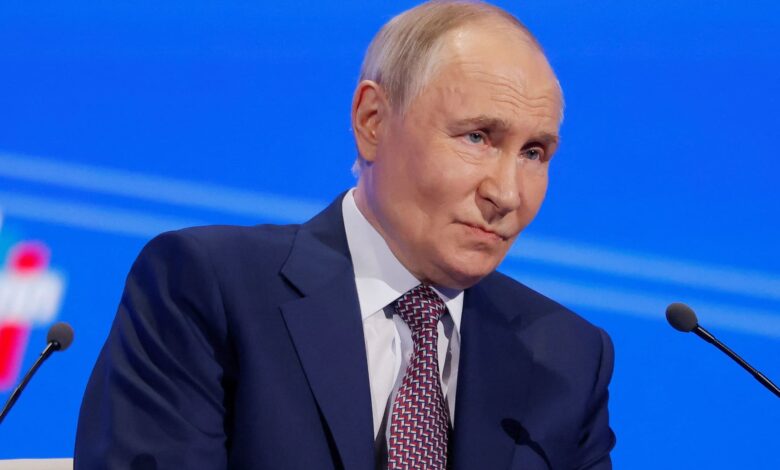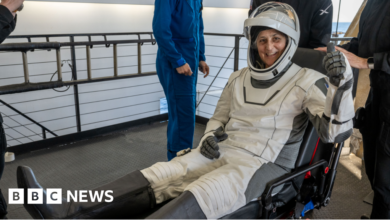
President Donald Trump and Russian President Vladimir Putin shake hands as they hold a joint news conference after their meeting in Helsinki, Finland, July 16, 2018.
Leonhard Foeger | Reuters
Russia escaped unscathed from President Donald Trump’s trade tariffs unveiled earlier this month, but the Kremlin says Moscow is not immune from the economic aftershocks that could ensue in a potential global trade war.
“Of course, instability in the global economy cannot but affect Russia,” Kremlin Press Secretary Dmitry Peskov told CNBC on Wednesday, according to a Google translation.
“At the same time, we manage to maintain macroeconomic stability even in the face of numerous sanctions,” Peskov added in emailed comments.
Unlike many U.S. allies who were hit with trade tariffs in Trump’s early-April announcement, Russia was spared new import tariffs when Trump announced his wide-ranging list of new duties to be imposed on imports from more than 180 countries, ostensibly aimed at leveling up the global trading playing field.
Russia was left out, White House Press Secretary Karoline Leavitt told the Axios media outlet, because U.S. sanctions on the country for its invasion of Ukraine in 2022 already precluded “any meaningful trade” between the two nations.
Analysts question that assertion, saying Russia still did more trade with the U.S. than a number of other countries that made it onto the tariffs list, such as Brunei and Mauritius. Ukraine, incidentally, was hit with a 10% tariff.
A White House official told CNBC Thursday that Russia, along with Cuba, Belarus and North Korea, were “not subject to the Reciprocal Tariff Executive Order because they are already facing extremely high tariffs and our previously imposed sanctions preclude any meaningful trade with these countries.” The official added that President Trump has also recently threatened to impose strong sanctions on Russia.
Global market turbulence prompted Trump to temporarily reduce the tariff rates on imports from most countries — barring China — to 10% for 90 days. Whether negotiations taking place with various trading partners in the interim can lead to compromise and, ultimately, trade deals is highly uncertain.
Russia’s reaction to Trump’s trade duties has been mixed, with state media observing the measures and market fallout with a mixture of cool detachment, some concern over global economic volatility and a touch of schadenfreude at the turbulence hitting the West.
Trump’s destabilization of the existing U.S.-led “global world order” — which Moscow would like to dismantle — is also seen as a potential benefit of the tariffs to Kremlin, analysts say. They warn that Russia is not immune to the impact of any trade war.
“On the surface you see a lot of giggles and genuine relief [in Russia] that, for once, it is not Russia that is at the center of attention,” Anton Barbashin, a Russian political analyst and editorial director of the journal Riddle, told CNBC on Wednesday, noting that “Russia does see itself better positioned in the world of a more pronounced bipolarity.”
“Russia wants a less global U.S. that is engaged in permanent conflict with China (though not war), so that Washington does not have enough time for Europe,” he said in emailed comments.
Russian President Vladimir Putin attends the Congress of the Russian Union of Industrialists and Entrepreneurs in Moscow, Russia March 18, 2025.
Maxim Shemetov | Reuters
Barbashin said two schools of thought had emerged in Russia — one recognizing the damage that a trade war could do to the country, and the other acknowledging that economically weakened rivals benefit Russia geopolitically.
“Russia is still dependent on global economy and high demand for her exports. If a global recession is to follow, it could seriously hurt Russia’s pockets. Yet there is another level of analysis in Russia that suggests that … the more he [Trump] does to harm the transatlantic relationship the easier it would be for Moscow to split Europe on issues related to Ukraine,” Barbashin noted.
Why no tariffs?
Russia analysts have questioned why Russia was not subjected to any tariffs, and whether its exclusion could be part of a White House plan to try to gain leverage over Moscow in any Ukraine peace talks.
“The White House said Russia was not hit with tariffs because there was no trade between the two countries due to the Western sanctions … That’s not entirely true,” Alexander Kolyandr, senior fellow at the Center for European Policy Analysis, noted.
Exports of Russian goods to the U.S. totaled a 30-year low of around $3 billion in 2024, and the U.S. exported $526 million worth of goods to Russia over the period, he noted.
“These are tiny numbers when it comes to overall U.S. trade, but, for example, Lesotho, an African kingdom with a population of 2 million, sells even less to the U.S. — about $2 billion worth of goods a year — but was hit with a 50% tariff,” Kolyandr noted.
According to the formula used to determine the tariffs on trading partners, Russia should have faced a 40% tariff, based on 2024 numbers. Kolyandr noted, however, that in recent pre-war years, Russia and the U.S. have enjoyed relatively balanced trade, which would have meant Russia hit instead with the baseline 10% tariff rate.
President Donald Trump and Russian President Vladimir Putin arrive for a joint news conference after their meeting in Helsinki, July 16, 2018.
Grigory Dukor | Reuters
Kolyandr told CNBC on Thursday that if there is a desire in the White House to use the tariffs as a way to induce Moscow into peace negotiations on Ukraine, “then it’s a delusion.”
“The size [of trade] is very small, and even before the war, the U.S. was not Russia’s significant trade partner compared to places like the European Union, Turkey, China or India.”
“Russia does need some technological stuff from the United States, such as spare parts for Boeing (airplanes], for example. And apart from Tungsten and Titanium, Russia has very little to offer to the United States which is not elastic, in other words, which cannot be procured somewhere else. So I don’t think that the trade tariffs are something Moscow can be seduced with to stop the war.”
Russia not immune
The World Trade Organization on Wednesday warned that the outlook for global trade has “deteriorated sharply” in the wake of Trump’s tariffs regime.
Based on the duties currently in place, and including a 90-day suspension of “reciprocal tariffs,” the volume of world merchandise trade is now expected to decline by 0.2% in 2025, the WTO said. It added that global economic growth would take a direct hit from a decline in global trading volumes.
Even if Russia is not a direct target, it’s certain to suffer collateral damage from tariffs and a potential trade war, analysts agree, with a decline in prices and demand for Russia’s main oil global export supplies posting a major economic risk.
Russia is already laboring under significant domestic inflation — which hit an annual 10.3% in March — and the country’s central bank has maintained high interest rates of 21% recently in a bid to deal with war-led price pressures.
Customers shop for milk and dairy items inside an Auchan Retail International hypermarket in Moscow, Russia.
Bloomberg | Bloomberg | Getty Images
“If the trade war pushes the global economy into a recession, and especially if overall trade goes down, which means fewer goods criss-cross the globe, that would mean that demand for oil would also go down if there is a recession, and it is painful for Russia,” Kolyandr told CNBC.
“But Russia’s problems do not end with oil. With global instability and a spike in inflation and, presumably, a decline of oil revenues, Russia’s central bank will find it difficult to start easing its base rate. It’s stifling the Russian non-military economy. So, basically, about two thirds of the national economy has to borrow at 21%. You cannot be healthy with such a high rate.”
President Donald Trump and Russian President Vladimir Putin shake hands as they hold a joint news conference after their meeting in Helsinki, Finland, July 16, 2018.
Leonhard Foeger | Reuters
Russia escaped unscathed from President Donald Trump’s trade tariffs unveiled earlier this month, but the Kremlin says Moscow is not immune from the economic aftershocks that could ensue in a potential global trade war.
“Of course, instability in the global economy cannot but affect Russia,” Kremlin Press Secretary Dmitry Peskov told CNBC on Wednesday, according to a Google translation.
“At the same time, we manage to maintain macroeconomic stability even in the face of numerous sanctions,” Peskov added in emailed comments.
Unlike many U.S. allies who were hit with trade tariffs in Trump’s early-April announcement, Russia was spared new import tariffs when Trump announced his wide-ranging list of new duties to be imposed on imports from more than 180 countries, ostensibly aimed at leveling up the global trading playing field.
Russia was left out, White House Press Secretary Karoline Leavitt told the Axios media outlet, because U.S. sanctions on the country for its invasion of Ukraine in 2022 already precluded “any meaningful trade” between the two nations.
Analysts question that assertion, saying Russia still did more trade with the U.S. than a number of other countries that made it onto the tariffs list, such as Brunei and Mauritius. Ukraine, incidentally, was hit with a 10% tariff.
A White House official told CNBC Thursday that Russia, along with Cuba, Belarus and North Korea, were “not subject to the Reciprocal Tariff Executive Order because they are already facing extremely high tariffs and our previously imposed sanctions preclude any meaningful trade with these countries.” The official added that President Trump has also recently threatened to impose strong sanctions on Russia.
Global market turbulence prompted Trump to temporarily reduce the tariff rates on imports from most countries — barring China — to 10% for 90 days. Whether negotiations taking place with various trading partners in the interim can lead to compromise and, ultimately, trade deals is highly uncertain.
Russia’s reaction to Trump’s trade duties has been mixed, with state media observing the measures and market fallout with a mixture of cool detachment, some concern over global economic volatility and a touch of schadenfreude at the turbulence hitting the West.
Trump’s destabilization of the existing U.S.-led “global world order” — which Moscow would like to dismantle — is also seen as a potential benefit of the tariffs to Kremlin, analysts say. They warn that Russia is not immune to the impact of any trade war.
“On the surface you see a lot of giggles and genuine relief [in Russia] that, for once, it is not Russia that is at the center of attention,” Anton Barbashin, a Russian political analyst and editorial director of the journal Riddle, told CNBC on Wednesday, noting that “Russia does see itself better positioned in the world of a more pronounced bipolarity.”
“Russia wants a less global U.S. that is engaged in permanent conflict with China (though not war), so that Washington does not have enough time for Europe,” he said in emailed comments.
Russian President Vladimir Putin attends the Congress of the Russian Union of Industrialists and Entrepreneurs in Moscow, Russia March 18, 2025.
Maxim Shemetov | Reuters
Barbashin said two schools of thought had emerged in Russia — one recognizing the damage that a trade war could do to the country, and the other acknowledging that economically weakened rivals benefit Russia geopolitically.
“Russia is still dependent on global economy and high demand for her exports. If a global recession is to follow, it could seriously hurt Russia’s pockets. Yet there is another level of analysis in Russia that suggests that … the more he [Trump] does to harm the transatlantic relationship the easier it would be for Moscow to split Europe on issues related to Ukraine,” Barbashin noted.
Why no tariffs?
Russia analysts have questioned why Russia was not subjected to any tariffs, and whether its exclusion could be part of a White House plan to try to gain leverage over Moscow in any Ukraine peace talks.
“The White House said Russia was not hit with tariffs because there was no trade between the two countries due to the Western sanctions … That’s not entirely true,” Alexander Kolyandr, senior fellow at the Center for European Policy Analysis, noted.
Exports of Russian goods to the U.S. totaled a 30-year low of around $3 billion in 2024, and the U.S. exported $526 million worth of goods to Russia over the period, he noted.
“These are tiny numbers when it comes to overall U.S. trade, but, for example, Lesotho, an African kingdom with a population of 2 million, sells even less to the U.S. — about $2 billion worth of goods a year — but was hit with a 50% tariff,” Kolyandr noted.
According to the formula used to determine the tariffs on trading partners, Russia should have faced a 40% tariff, based on 2024 numbers. Kolyandr noted, however, that in recent pre-war years, Russia and the U.S. have enjoyed relatively balanced trade, which would have meant Russia hit instead with the baseline 10% tariff rate.
President Donald Trump and Russian President Vladimir Putin arrive for a joint news conference after their meeting in Helsinki, July 16, 2018.
Grigory Dukor | Reuters
Kolyandr told CNBC on Thursday that if there is a desire in the White House to use the tariffs as a way to induce Moscow into peace negotiations on Ukraine, “then it’s a delusion.”
“The size [of trade] is very small, and even before the war, the U.S. was not Russia’s significant trade partner compared to places like the European Union, Turkey, China or India.”
“Russia does need some technological stuff from the United States, such as spare parts for Boeing (airplanes], for example. And apart from Tungsten and Titanium, Russia has very little to offer to the United States which is not elastic, in other words, which cannot be procured somewhere else. So I don’t think that the trade tariffs are something Moscow can be seduced with to stop the war.”
Russia not immune
The World Trade Organization on Wednesday warned that the outlook for global trade has “deteriorated sharply” in the wake of Trump’s tariffs regime.
Based on the duties currently in place, and including a 90-day suspension of “reciprocal tariffs,” the volume of world merchandise trade is now expected to decline by 0.2% in 2025, the WTO said. It added that global economic growth would take a direct hit from a decline in global trading volumes.
Even if Russia is not a direct target, it’s certain to suffer collateral damage from tariffs and a potential trade war, analysts agree, with a decline in prices and demand for Russia’s main oil global export supplies posting a major economic risk.
Russia is already laboring under significant domestic inflation — which hit an annual 10.3% in March — and the country’s central bank has maintained high interest rates of 21% recently in a bid to deal with war-led price pressures.
Customers shop for milk and dairy items inside an Auchan Retail International hypermarket in Moscow, Russia.
Bloomberg | Bloomberg | Getty Images
“If the trade war pushes the global economy into a recession, and especially if overall trade goes down, which means fewer goods criss-cross the globe, that would mean that demand for oil would also go down if there is a recession, and it is painful for Russia,” Kolyandr told CNBC.
“But Russia’s problems do not end with oil. With global instability and a spike in inflation and, presumably, a decline of oil revenues, Russia’s central bank will find it difficult to start easing its base rate. It’s stifling the Russian non-military economy. So, basically, about two thirds of the national economy has to borrow at 21%. You cannot be healthy with such a high rate.”
https://image.cnbcfm.com/api/v1/image/108117510-17423024422025-03-18t125101z_1414640235_rc2ofdachm6t_rtrmadp_0_russia-business-putin.jpeg?v=1742302667&w=1920&h=1080
2025-04-17 13:04:00






